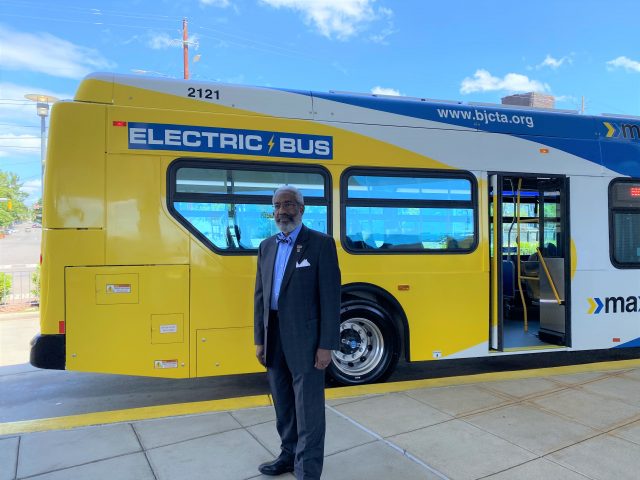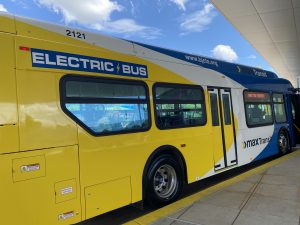
By Erica Wright
The Birmingham Times
The Birmingham-Jefferson County Transit Authority (BJCTA) on Thursday unveiled a glimpse of the future with the addition of two electric buses to its fleet.
Frank T. Martin, CEO of the BJCTA, called it a great day for MAX and riders.

“Electric buses will over time replace diesel buses and compressed natural gas [CNG],” said Martin, during the unveiling at the MAX Central Station in downtown Birmingham. “We are excited to introduce the first of what may be more electric vehicles to be added to our fleet in the future.”
The two 35-foot battery electric buses will require less maintenance “and we’ll be able to identify lower costs,” Martin said. “It is cutting edge and Birmingham has been a leader in making sure that the equipment we’re providing to the community makes the environment safe and clean and take passengers where they need to go through the course of their day.”
The buses are expected to be in service in about two or three months after extensive training for BJCTA staff. “We have a lot of work we need to do to understand the working of these electric buses and make sure our maintenance staff is properly trained,” said the CEO.
Martin said electric vehicles are becoming more prevalent as manufacturers are looking at electric cars as the next wave. “Similarly, with the transit industry, over the last three to four years we’ve had a number of bus manufacturers build electric buses,” he said.
The vehicles were purchased after the agency received $1.5 million from the Federal Transit Administration (FTA) following application for a low emission, no emission grant. The funds were used to purchase the two 35-foot battery electric buses, as well as specialized training, dual depot charger and charging infrastructure.
Electric buses are safer for the environment and more efficient, Martin said. “When you compare an electric bus to a diesel bus, you have fewer moving parts, the maintenance will not be as intensive over the long term, it will be more cost effective than operating a CNG or diesel bus,” said Martin.
Martin said there is a lot to learn before the buses are put in service.
“We need to determine exactly the range, making sure whatever routes we put the buses on, that they will be able to stay out there for the length of time before coming back to our main operating facility for recharging,” he said. “In cities with electric buses already there may be recharging stations at stops on the route.”
The electric buses will be on display Saturday at Pepper Place Market from 8 a.m. to noon during an event sponsored by the Alabama Clean Fuel Coalition.
For more information, visit www.maxtransit.org.




